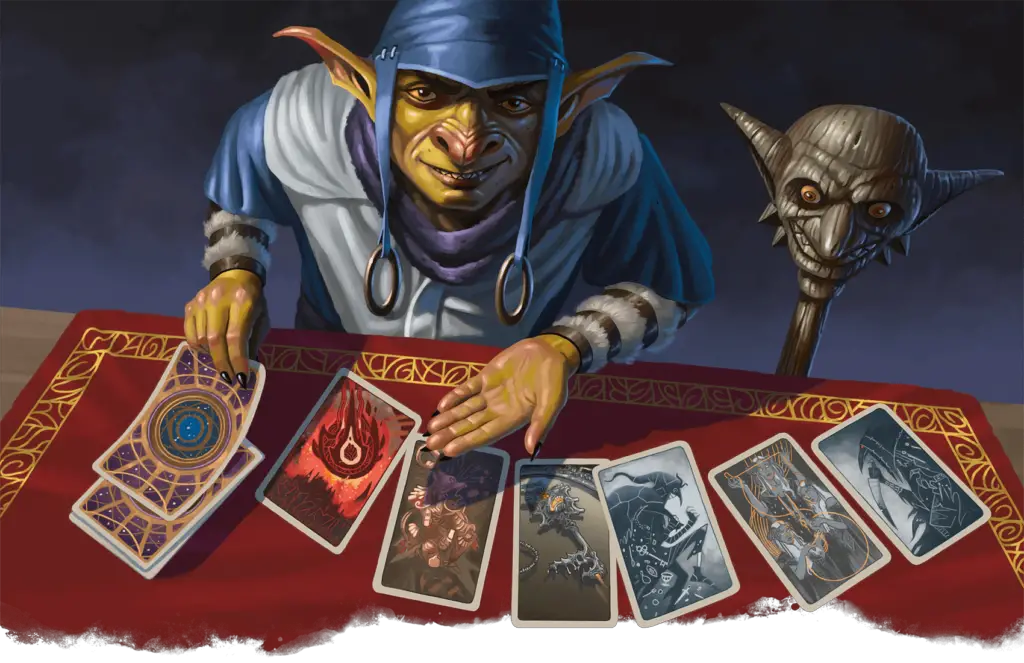D&D Divination Wizard Portent Overrated featured image is credited to Wizards of the Coast’s D&D 5e Explorer’s Guide to Wildemount.
Disclaimer: This article contains affiliate links that add gold to our coffers.
I keep hearing people say that the Divination Wizard is great because it gets the Portent ability. While it’s a good subclass feature, I believe it’s extremely overrated. It’s not worth the S-tier that people tend to give the subclass. Portent has several severe limitations, and the rest of the Divination Wizard’s subclass features are not very useful.
Since I don’t believe Portent can carry the Divination Wizard on its own, I believe it’s overrated. I’ll spend this article explaining why! I want to make it clear that I am not saying Portent is bad (just overrated). This is a commentary on the community’s perception of it, and nothing more.
Tell me if you have counterpoints or if you agree with me in the comments. The Divination Wizard subclass is found in D&D 5e’s Player’s Handbook.
Divination Wizard Portent: What It Does
Portent allows the Wizard to rolls 2d20 when completing a long rest. The results of those rolls are kept for use at a later time. It’s as if the Wizard foresaw the result of two rolls to come.
The d20s rolled for Portent can substitute for a saving throw, ability check, or attack roll that the Wizard can see. Diviners have until their next long rest to use the Portent rolls before they disappear.
Portent is great for guaranteeing yourself a high Initiative roll or lowering the roll of an enemy (since Initiative is a skill check). Ones and twenties rolled by Portent can allow you and your allies to critically hit an attack or force an enemy to automatically miss an attack. Low rolls can be used to make enemies fail a saving throw without rolling. Your low-level Counterspell roll for success against a high-level spell may surely succeed if Portent makes it so.
What Are Portent’s Limitations?
I’ll describe the limitations of Portent to strengthen my argument that it is overrated.
Portent Is Once Per Turn
Though it doesn’t require a reaction (that’s good), it’s still limited to being used once per turn. This is a minor limitation if you’re using Portent to falter a creature’s saving throw against your spell save DC. Using Portent effectively will mean this limitation doesn’t get in the way of your goal.
Portent Requires Line of Sight
A moderate limitation is the line of sight. If your Diviner cannot see the creature that is about to make a roll, a Portent d20 cannot be substituted. This means spells like Fog Cloud can potentially disable Portent. Fog Cloud can block the Diviner from seeing a creature!
Your vision can also be impeded by darkness if you lack darkvision. Even if you have darkvision, most creatures can only see up to sixty feet in the dark.
Invisible creatures are unseen to the Diviner (until perhaps at later levels with other divination abilities and spells). An unseen creature can’t have its rolls substituted by Portent.
Portent Is Used Before a Roll as a Gamble
The Diviner must decide before a roll is made if they want to substitute a Portent d20. This is a heavy limitation! Many abilities and spells allow you to know if a creature succeeds or fails at a roll before you expend your resource to react in some way.
The Shield spell is a perfect example of a resource that is used in response to a successful roll. Casting Shield requires a reaction in response to being hit with an attack, not merely being attacked. It wouldn’t be as reliable if you had to declare that you were casting Shield when you’re attacked but before the roll is made. After all, if the attack would’ve missed you, Shield might be used wastefully.
I believe this is the biggest downside to using Portent. If you don’t know whether a creature rolled well or poorly, you don’t know if you’ll be using Portent to guarantee a result that might’ve happened anyway. It’s like Schrodinger’s Cat; until you know if a roll will succeed or not, you can assume it’s both a success and a failure. Until you open the box (the DM declares success or failure), you don’t know the result.
Divination Wizard Portent Relies too Much on Predicting Modifiers
You might roll a one or a twenty on your Portent, in which case you will be excited to use those Portent dice. Guaranteeing a critical hit can be huge for one of your party members, especially smite-happy Paladins. Most other rolls, however, are less exciting. Why is that? Let’s say you roll a five or a fifteen. You can probably guarantee a successful attack or saving throw with a fifteen. A five will likely thwart an enemy attack or saving throw. This sounds good, but you might actually be doing nothing. The roll that would’ve happened without Portent’s interference might have gotten the same result that Portent caused.
Substituting the roll of five doesn’t matter if the enemy would’ve rolled a four anyway. You will never know what would’ve been! I admit many DMs likely allow Divination Wizards to retroactively use Portent dice after rolls are made. I’ve talked to people who thought that was how Portent worked, so I know DMs allow it (or at least are ignorant to it). At a table where the DM allows post-roll Portent interference, Portent is much stronger.
Conclusion on Portent
Due to its number manipulation’s dependence on assuming what a creature would’ve rolled, you almost need to be a proficient metagamer and mathematician in order to weigh whether you should use Portent or not. If you know an enemy’s attack modifier, for example, you’ll know if you can thwart an attack with the Portent die that you rolled when you long rested. Knowing whether a monster is proficient in Charisma saving throws is crucial if you need to know how likely it is to resist your Banishment spell. You’ll also need to see the creature you’re thwarting or helping, and you can’t manipulate the rolls more than once per turn.
Portent might be one of the best level-two Wizard subclass features, but it’s not insane like people believe it to be. If you’re really good at gambling and predicting monster modifiers, you can covertly use Portent to great efficacy. It’s still a good feature that players enjoy using, but it’s not crazy enough to make me want to play a Divination Wizard with its higher-level subclass features disappointing me.
With these limitations, do you think I’m still wrong to think Portent is overrated? Is it still insanely powerful in your eyes? I’m happy to discuss this in the comments. After all, it’s just a game, so let’s talk about it!
I also recommend reading my article about all the Wizard subclasses as I review and rank them. We have many other Wizard articles, too. Have a great adventure this weekend.





I don’t know about it. It’s one of those low level things that you read and think “oh man that is super powerful!” Then you try to utilize it in game and just feels underwhelming. Plus, once you get to higher levels, there are probably any number of spells or abilities to use that could at least replicate the biggest part of it. I think I’d actually like it better if I could burn my reaction to use it after the fact. Which, to me, feels more mechanically in line with what portent is anyway. Like…oh i remember this…yes she said that…and then that bird flew by..and then THE CHANDELIER IS FALLING OF COURSE…and my clumsy, slow footed paladin doesn’t recognize it! Let me scream out to him “Hey Rhogar! Watch out!”
And scene…
Do you think if it were to cost your reaction but you could only do it once (one dice roll to use) at level two, it would still be tempting to take?
Nah probably not. 2 levels is an expensive dip for only a single die. It’d be WAY better if it actually tied into divination spells. Like you get a portent roll each time you cast a divvy spell and that roll keeps until your next long rest or something like that. Can hold a max equal to your prof modifier maybe. That is probably a massively wild over correction but then it might be worth it.
I’m inclined to agree. Thanks for entertaining the hypothetical 😛
I think the key thing your missing with portent is ability checks. Out of combat it is a utility king. You can spend 10ish days waiting for a 20 portent roll before talking to the king for example. Or just give a 4 to insight when you lie to an important npc. Guarantee a slight of hand goes off etc. Portent is strong becase 75 percent(chances of getting a low roll or a high roll on one of your dice)of the time you can guarantee an important contested roll goes off in your favor.
While Portent is useful for skill checks, it’s not something I overlooked when I made the claim that Portent is overrated by the community. Some adventuring parties delay important tasks for weeks until they get a useful Portent roll.
I think you’re missing the point a bit. Orther abilities, like the Lucky feat, allow you to change a roll after you see it, but you don’t know if the new roll you’re going to get is going to be helpful. With Portent you choose to use it before the roll, but you know beforehand exactly what is the new result of the roll. With the Lucky feat you can roll an attack, get an unlucky 1, choose to spend a Luck point to roll an additional dice, and roll another 1, effectively loosing that resource and getting the same outcome. With Portent you know that, for example, you have a 7 and a 16, which implies that, whenever you want, a roll is going to be one of those results. That’s the opposite of a gamble, is knowing exactly which outcome you’re getting. If you let the enemy roll, that’s the gamble, and what you do with Portent is avoiding exactly that gamble and ensuring an outcome.
The limitation with the need of sight is something common in skills and spells, so pointing it out as a detrimental feature about Portent is a bit absurd. Besides, Portent doesn’t have any maximum range, which is also something most skills and spells DO have. And yes, you can only do it once per turn, but as you said it doesn’t cost any Action, Bonus Action or Reaction, effectively granting you an extra “Free Action” to use it. You point it out as a flaw, but there are many other things that you can only do once per turn AND need an action of some kind, like casting a spell, using the Monk’s Flurry of Blows, using the Druid’s Wildshape… Most things can only be done once per turn and need some action, so in comparison Portent is quite good since you can do it even if you’ve already taken one action, bonus action and reaction this turn.
To compare it with something else that also modifies rolls, Bardic Inspiration doesn’t need you to see the creature, but the creature needs to hear you, giving a simmilar result. In addittion, Bardic Inspiration can only be used on creatures within 60 feet of you, and you need to use a Bonus Action, wich directly implies that you can only use it once per turn. And, once you use it, the selected creature can choose to add your Bardic Inspiration Die to a roll it makes, and can do it once it has seen the D20 roll, but before the DM says if it succeeds or not, and even after the added die roll it can still fail (if the original roll was a 14 against a DC 16, the creature can choose to roll the die and roll a 1).
So, Bardic Inspiration’s hearing limitation is comparable to the Portent’s sight limitation, but it has a limit range that Portent doesn’t have. You can only use both once per turn, but only Bardic Inspiration takes a Bonus Action. The Bardic Inspiration’s selected creature can choose to use it after the roll, but that’s a gamble unless it only needs an extra 1 to succeed. In both cases, is a gamble if you don’t know all the modifiers and DC’s involved, but it is only a gamble for the Bardic Inspiration if you DO know them. The only features that are truly better in Bardic Inspiration are that you’re adding an extra 1-12 points to a roll (at max levels) instead of changing the roll itself, and the fact that it has more uses than the Portent. In any other sense, it has every flaw you point out about Portent and some additional ones.
Not saying Bardic Inspiration is useless, it’s also a great skill, just using it to point out how Portent has some really good features compared to other skills.
BTW, I’ve seen your answer to another user about using Portent out of combat, and you say some adventuring parties delay important tasks for as long as it takes until they get a good Portent roll. That, more than a flaw about the Portent, is due to bad DMing. A good DM should find a way to stop that, and in fact it’s quite easy to do so. For example, if the party wants to convince a noblemen to give them a magic sword and try to exploit the Portent rolls, when they get the 20 they wanted for their Charisma roll and go to see the noblemen, SURPRISE! The sword has been stolen while the party wasn’t doing anything. Or maybe the noblemen sold it to a merchant, or sent it as a gift to the king. If the players act as if the world is going to stay still until they get the Portent rolls they want, it’s the DM’s job to make them realise that’s not how things work.
Thanks for your thoughts! Do you consider Portent to be a godly ability instead of just really good? My argument is that it’s overrated when people call it godly.
Some of my points about sight and range were not meant as heavy criticisms; they’re meant to temper players’ opinions of the ability since they tend to think of it as applicable to all rolls and that’s all the thought they put into it.
The comment point about the adventuring party delaying action until they get a good roll was actually a funny story from a good DM.
I don’t think it’s a godly power, or maybe a godly power, but with such a small amount of uses it doesn’t amount to a godly ability. That said, I do think the analysis is overly harsh of it.
The requirement that you have to see it to affect it is a limitation, but I believe it’s much less of a limitation than made out to be. Most things a character will be doing, they will be doing when they can see,such as casting a spell. I’m wavering on if a spell save roll for yourself should be affected by blindness. Strictly reading it, yes, but you also don’t really look at yourself while doing a saving throw in normal conditions either, so *shrug*. Really you’re limited in using it on attack rolls made by other creatures and players or saves from spells by other casters. It’s not unlikely to happen at some point, but it seems like it’ll be uncommon enough that you’ll get full utility from the ability regardless. So I don’t think this is anything except a minor limitation.
Having to use portent before the roll is made is a limitation in a sense, although I love the mechanic and it fits perfectly with the idea behind it (you already saw the outcome, you aren’t actually changing the outcome (quantum mechanics aside)). Game play, that does mean you can’t wait to see you had an undesirable outcome and alter, but I don’t see this as being as big of limitation as you’re showing.
Rather than seeing this as if I rolled a 20 anyway, the 18 on my portent is wasted. I see it as, I have a 30% chance of succeeding this important roll, vs a 100% if I use the portent. For instance, I’m making a deception check to pretend I’m someone who belongs in bad guys camp. I have to roll an 8 to succeed it. That’s not too hard, but I’m surrounded by badies and gonna get ganked if I fail it. So while I have a 60% chance of success, I will probably die if I fail, so I’m just going to succeed. Used judiciously on ‘can’t fail’ tasks and it can save you from some nasty consequences at the right moment. It’s true that you have to math it a bit and figure out creatures’ modifiers so you have to do quick math and be paying attention and yes metagaming, but anything that manipulates die rolls or ability modifiers is already metagamey, so we just have to live with it.
The only thing that’s a major limiting factor for me is that you only get 2 dice for it (3 at higher levels). That’s where it goes from a godly power that changes the fabric of reality, to something that nudges reality slightly off course in your favor. You have to figure out where small changes will make an oversized impact.
So, I agree in a sense that it isn’t playing on god mode, but I do think the analysis is overly pessimistic on it.
That said, I’m planning to do a 2 level dip for divination wizard on my eloquence bard because all I really lose for it is an asi in the long run, and the short run, picking up shield, a familiar, and the portent will be a lot of screwy fun for the guy (we rolled stats and I got ridiculously good rolls, so at level 3 I have maxed charisma and 16 int). The guy is a scam artist, and at level 1 I accidently walked into a lawful evil level 11… probably ranger’s mansion and scammed him out of 50 gold. The DM told me afterwards that we tied on a deception check I made. If I failed the guy would have attacked and killed me, and he wouldn’t have stopped it 🤣
All great thoughts! I don’t mean to be pessimistic, but I do mean to point out the limitations that people tend to ignore or forget when talking about Portent. Your character sounds fun! Portent is a fantastic feature to pick up from multiclass dipping (plus the spellcasting perks).